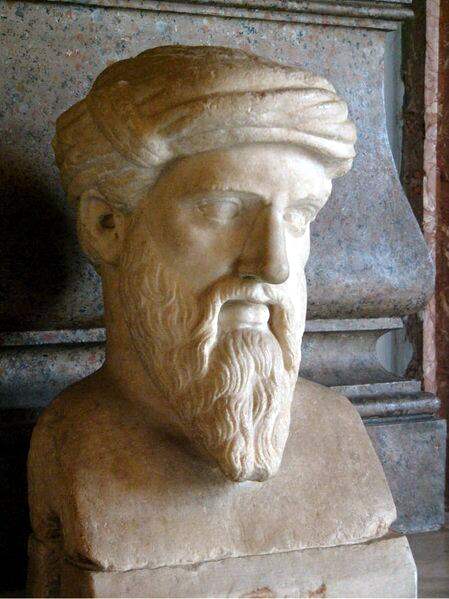|
Hippasus Of Metapontum
Hippasus of Metapontum (; , ''Híppasos''; c. 530 – c. 450 BC) was a Greeks, Greek philosopher and early follower of Pythagoras. Little is known about his life or his beliefs, but he is sometimes credited with the discovery of the existence of irrational numbers. The discovery of irrational numbers is said to have been shocking to the Pythagoreans, and Hippasus is supposed to have drowned at sea, apparently as a punishment from the Greek gods, gods for divulging this and crediting it to himself instead of Pythagoras, which was the norm in Pythagorean society. The few ancient sources who describe this story, however, either do not mention Hippasus by name (e.g., Pappus) or alternatively tell that Hippasus drowned because he revealed how to construct a dodecahedron inside a sphere. The discovery of irrationality is not specifically ascribed to Hippasus by any ancient writer. Life Little is known about the life of Hippasus. He may have lived in the late 5th century BC, about a cen ... [...More Info...] [...Related Items...] OR: [Wikipedia] [Google] [Baidu] |
Pythagoreanism
Pythagoreanism originated in the 6th century BC, based on and around the teachings and beliefs held by Pythagoras and his followers, the Pythagoreans. Pythagoras established the first Pythagorean community in the Ancient Greece, ancient Greek colony of Crotone, Kroton, in modern Calabria (Italy) circa 530 BC. Early Pythagorean communities spread throughout Magna Graecia. Already during Pythagoras' life it is likely that the distinction between the ''akousmatikoi'' ("those who listen"), who is conventionally regarded as more concerned with religious, and ritual elements, and associated with the oral tradition, and the ''mathematikoi'' ("those who learn") existed. The ancient biographers of Pythagoras, Iamblichus () and his master Porphyry (philosopher), Porphyry ( ) seem to make the distinction of the two as that of 'beginner' and 'advanced'. As the Pythagorean cenobites practiced an esoteric path, like the Greco-Roman mysteries, mystery schools of antiquity, the adherents, ''akou ... [...More Info...] [...Related Items...] OR: [Wikipedia] [Google] [Baidu] |
Pappus Of Alexandria
Pappus of Alexandria (; ; AD) was a Greek mathematics, Greek mathematician of late antiquity known for his ''Synagoge'' (Συναγωγή) or ''Collection'' (), and for Pappus's hexagon theorem in projective geometry. Almost nothing is known about his life except for what can be found in his own writings, many of which are lost. Pappus apparently lived in Alexandria, where he worked as a Mathematics education, mathematics teacher to higher level students, one of whom was named Hermodorus.Pierre Dedron, J. Itard (1959) ''Mathematics And Mathematicians'', Vol. 1, p. 149 (trans. Judith V. Field) (Transworld Student Library, 1974) The ''Collection'', his best-known work, is a compendium of mathematics in eight volumes, the bulk of which survives. It covers a wide range of topics that were part of the ancient mathematics curriculum, including geometry, astronomy, and mechanics. Pappus was active in a period generally considered one of stagnation in mathematical studies, where, to s ... [...More Info...] [...Related Items...] OR: [Wikipedia] [Google] [Baidu] |
Drown
Drowning is a type of suffocation induced by the submersion of the mouth and nose in a liquid. Submersion injury refers to both drowning and near-miss incidents. Most instances of fatal drowning occur alone or in situations where others present are either unaware of the victim's situation or unable to offer assistance. After successful resuscitation, drowning victims may experience breathing problems, confusion, or unconsciousness. Occasionally, victims may not begin experiencing these symptoms until several hours after they are rescued. An incident of drowning can also cause further complications for victims due to low body temperature, aspiration, or acute respiratory distress syndrome (respiratory failure from lung inflammation). Drowning is more likely to happen when spending extended periods of time near large bodies of water. Risk factors for drowning include alcohol use, drug use, epilepsy, minimal swim training or a complete lack of training, and, in the case of child ... [...More Info...] [...Related Items...] OR: [Wikipedia] [Google] [Baidu] |
Bronze
Bronze is an alloy consisting primarily of copper, commonly with about 12–12.5% tin and often with the addition of other metals (including aluminium, manganese, nickel, or zinc) and sometimes non-metals (such as phosphorus) or metalloids (such as arsenic or silicon). These additions produce a range of alloys some of which are harder than copper alone or have other useful properties, such as strength, ductility, or machinability. The archaeological period during which bronze was the hardest metal in widespread use is known as the Bronze Age. The beginning of the Bronze Age in western Eurasia is conventionally dated to the mid-4th millennium BCE (~3500 BCE), and to the early 2nd millennium BCE in China; elsewhere it gradually spread across regions. The Bronze Age was followed by the Iron Age, which started about 1300 BCE and reaching most of Eurasia by about 500 BCE, although bronze continued to be much more widely used than it is in modern times. Because historica ... [...More Info...] [...Related Items...] OR: [Wikipedia] [Google] [Baidu] |
Music Theory
Music theory is the study of theoretical frameworks for understanding the practices and possibilities of music. ''The Oxford Companion to Music'' describes three interrelated uses of the term "music theory": The first is the "Elements of music, rudiments", that are needed to understand Musical notation, music notation (key signatures, time signatures, and Chord chart, rhythmic notation); the second is learning scholars' views on music from Ancient history, antiquity to the present; the third is a sub-topic of musicology that "seeks to define processes and general principles in music". The musicological approach to theory differs from music analysis "in that it takes as its starting-point not the individual work or performance but the fundamental materials from which it is built." Music theory is frequently concerned with describing how musicians and composers make music, including Musical tuning, tuning systems and composition methods among other topics. Because of the ever-expan ... [...More Info...] [...Related Items...] OR: [Wikipedia] [Google] [Baidu] |
Phaedo
''Phaedo'' (; , ''Phaidōn'') is a dialogue written by Plato, in which Socrates discusses the immortality of the soul and the nature of the afterlife with his friends in the hours leading up to his death. Socrates explores various arguments for the soul's immortality with the Pythagorean philosophers Simmias and Cebes of Thebes in order to show that there is an afterlife in which the soul will dwell following death. The dialogue concludes with a mythological narrative of the descent into Tarturus and an account of Socrates' final moments before his execution. Background The dialogue is set in 399 BCE, in an Athenian prison, during the last hours prior to the death of Socrates. It is presented within a frame story by Phaedo of Elis, who is recounting the events to Echecrates, a Pythagorean philosopher. Characters Speakers in the frame story: * Phaedo of Elis: a follower of Socrates, a youth allegedly enslaved as a prisoner of war, whose freedom was purchased at Soc ... [...More Info...] [...Related Items...] OR: [Wikipedia] [Google] [Baidu] |
Plato
Plato ( ; Greek language, Greek: , ; born BC, died 348/347 BC) was an ancient Greek philosopher of the Classical Greece, Classical period who is considered a foundational thinker in Western philosophy and an innovator of the written dialogue and dialectic forms. He influenced all the major areas of theoretical philosophy and practical philosophy, and was the founder of the Platonic Academy, a philosophical school in History of Athens, Athens where Plato taught the doctrines that would later become known as Platonism. Plato's most famous contribution is the theory of forms, theory of forms (or ideas), which aims to solve what is now known as the problem of universals. He was influenced by the pre-Socratic thinkers Pythagoras, Heraclitus, and Parmenides, although much of what is known about them is derived from Plato himself. Along with his teacher Socrates, and his student Aristotle, Plato is a central figure in the history of Western philosophy. Plato's complete ... [...More Info...] [...Related Items...] OR: [Wikipedia] [Google] [Baidu] |
Scholium
Scholia (: scholium or scholion, from , "comment", "interpretation") are grammar, grammatical, critical, or explanatory comments – original or copied from prior commentaries – which are inserted in the margin of the manuscript of ancient authors, as gloss (annotation), glosses. One who writes scholia is a scholiast. The earliest attested use of the word dates to the 1st century BC. History Ancient scholia are important sources of information about many aspects of the ancient world, especially ancient History of literature, literary history. The earliest scholia, usually anonymous, date to the 5th or 4th century BC (such as the ''scholia minora'' to the ''Iliad''). The practice of compiling scholia continued to late Byzantine times, outstanding examples being Archbishop Eustathius of Thessalonica, Eustathius' massive commentaries to Homer in the Byzantine Empire under the Komnenos dynasty, 12th century and the ''scholia recentiora'' of Thomas Magister, Demetrius ... [...More Info...] [...Related Items...] OR: [Wikipedia] [Google] [Baidu] |
Diogenes Laërtius
Diogenes Laërtius ( ; , ; ) was a biographer of the Greek philosophers. Little is definitively known about his life, but his surviving book ''Lives and Opinions of Eminent Philosophers'' is a principal source for the history of ancient Greek philosophy. His reputation is controversial among scholars because he often repeats information from his sources without critically evaluating it. In many cases, he focuses on insignificant details of his subjects' lives while ignoring important details of their philosophical teachings and he sometimes fails to distinguish between earlier and later teachings of specific philosophical schools. However, unlike many other ancient secondary sources, Diogenes Laërtius tends to report philosophical teachings without trying to reinterpret or expand on them, and so his accounts are often closer to the primary sources. Due to the loss of so many of the primary sources on which Diogenes relied, his work has become the foremost surviving source on the ... [...More Info...] [...Related Items...] OR: [Wikipedia] [Google] [Baidu] |
Arche
In philosophy and science, a first principle is a basic proposition or assumption that cannot be deduced from any other proposition or assumption. First principles in philosophy are from first cause attitudes and taught by Aristotelians, and nuanced versions of first principles are referred to as postulates by Kantians. In mathematics and formal logic, first principles are referred to as axioms or postulates. In physics and other sciences, theoretical work is said to be from first principles, or '' ab initio'', if it starts directly at the level of established science and does not make assumptions such as empirical model and parameter fitting. "First principles thinking" consists of decomposing things down to the fundamental axioms in the given arena, before reasoning up by asking which ones are relevant to the question at hand, then cross referencing conclusions based on chosen axioms and making sure conclusions do not violate any fundamental laws. Physicists include counterint ... [...More Info...] [...Related Items...] OR: [Wikipedia] [Google] [Baidu] |
Sextus Empiricus
Sextus Empiricus (, ; ) was a Greek Pyrrhonist philosopher and Empiric school physician with Roman citizenship. His philosophical works are the most complete surviving account of ancient Greek and Roman Pyrrhonism, and because of the arguments they contain against the other Hellenistic philosophies, they are also a major source of information about those philosophies. Life Little is known about Sextus Empiricus. He likely lived in Alexandria, Rome, or Athens. His Roman name, Sextus, implies he was a Roman citizen. The ''Suda,'' a 10th-century Byzantine encyclopedia, states that he was the same person as Sextus of Chaeronea,Suda, Sextos σ 235. as do other pre-modern sources, but this identification is commonly doubted. In his medical work, as reflected by his name, tradition maintains that he belonged to the Empiric school in which Pyrrhonism was popular. However, at least twice in his writings, Sextus seems to place himself closer to the Methodic school. Philosophy ... [...More Info...] [...Related Items...] OR: [Wikipedia] [Google] [Baidu] |







